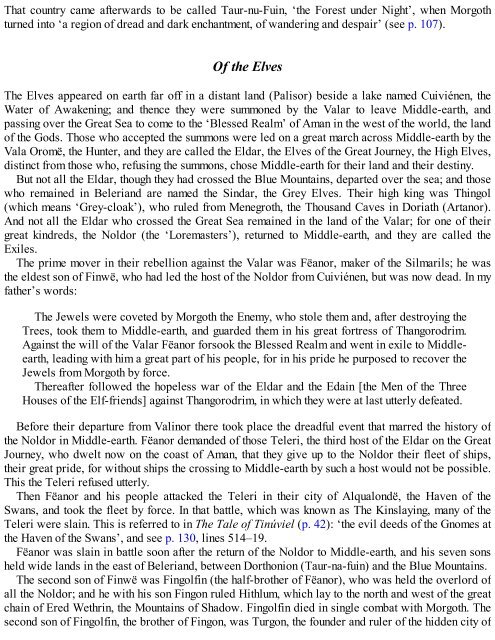You also want an ePaper? Increase the reach of your titles
YUMPU automatically turns print PDFs into web optimized ePapers that Google loves.
That country came afterwards to be called Taur-nu-Fuin, ‘the Forest under Night’, when Morgoth<br />
turned into ‘a region of dread and dark enchantment, of wandering and despair’ (see p. 107).<br />
Of the Elves<br />
The Elves appeared on earth far off in a distant land (Palisor) beside a lake named Cuiviénen, the<br />
Water of Awakening; and thence they were summoned by the Valar to leave Middle-earth, and<br />
passing over the Great Sea to come to the ‘Blessed Realm’ of Aman in the west of the world, the land<br />
of the Gods. Those who accepted the summons were led on a great march across Middle-earth by the<br />
Vala Oromë, the Hunter, and they are called the Eldar, the Elves of the Great Journey, the High Elves,<br />
distinct from those who, refusing the summons, chose Middle-earth for their land and their destiny.<br />
But not all the Eldar, though they had crossed the Blue Mountains, departed over the sea; and those<br />
who remained in Beleriand are named the Sindar, the Grey Elves. Their high king was Thingol<br />
(which means ‘Grey-cloak’), who ruled from Menegroth, the Thousand Caves in Doriath (Artanor).<br />
And not all the Eldar who crossed the Great Sea remained in the land of the Valar; for one of their<br />
great kindreds, the Noldor (the ‘Loremasters’), returned to Middle-earth, and they are called the<br />
Exiles.<br />
The prime mover in their rebellion against the Valar was Fëanor, maker of the Silmarils; he was<br />
the eldest son of Finwë, who had led the host of the Noldor from Cuiviénen, but was now dead. In my<br />
father’s words:<br />
The Jewels were coveted by Morgoth the Enemy, who stole them and, after destroying the<br />
Trees, took them to Middle-earth, and guarded them in his great fortress of Thangorodrim.<br />
Against the will of the Valar Fëanor forsook the Blessed Realm and went in exile to Middleearth,<br />
leading with him a great part of his people, for in his pride he purposed to recover the<br />
Jewels from Morgoth by force.<br />
Thereafter followed the hopeless war of the Eldar and the Edain [the Men of the Three<br />
Houses of the Elf-friends] against Thangorodrim, in which they were at last utterly defeated.<br />
Before their departure from Valinor there took place the dreadful event that marred the history of<br />
the Noldor in Middle-earth. Fëanor demanded of those Teleri, the third host of the Eldar on the Great<br />
Journey, who dwelt now on the coast of Aman, that they give up to the Noldor their fleet of ships,<br />
their great pride, for without ships the crossing to Middle-earth by such a host would not be possible.<br />
This the Teleri refused utterly.<br />
Then Fëanor and his people attacked the Teleri in their city of Alqualondë, the Haven of the<br />
Swans, and took the fleet by force. In that battle, which was known as The Kinslaying, many of the<br />
Teleri were slain. This is referred to in The Tale of Tinúviel (p. 42): ‘the evil deeds of the Gnomes at<br />
the Haven of the Swans’, and see p. 130, lines 514–19.<br />
Fëanor was slain in battle soon after the return of the Noldor to Middle-earth, and his seven sons<br />
held wide lands in the east of Beleriand, between Dorthonion (Taur-na-fuin) and the Blue Mountains.<br />
The second son of Finwë was Fingolfin (the half-brother of Fëanor), who was held the overlord of<br />
all the Noldor; and he with his son Fingon ruled Hithlum, which lay to the north and west of the great<br />
chain of Ered Wethrin, the Mountains of Shadow. Fingolfin died in single combat with Morgoth. The<br />
second son of Fingolfin, the brother of Fingon, was Turgon, the founder and ruler of the hidden city of
















